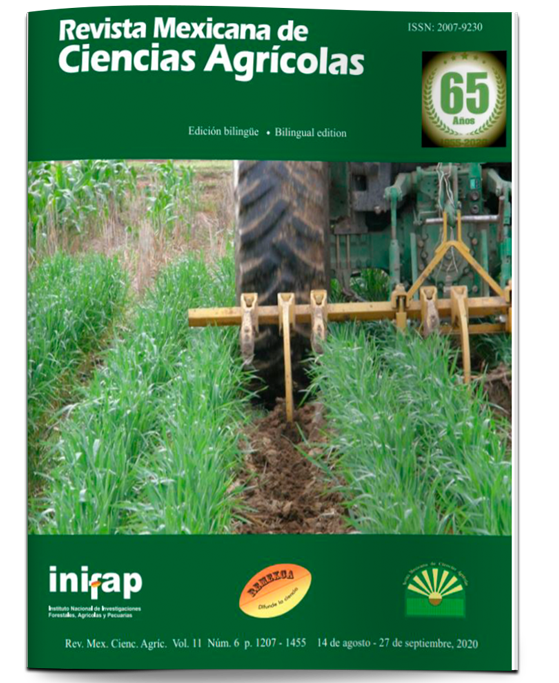Effect of the application of Levasa (sugar cane must) on the production and quality of Agave Tequilana Weber
DOI:
https://doi.org/10.29312/remexca.v11i6.2216Keywords:
Agave tequilana Weber., biofertilizer, organic agricultural productionAbstract
The use of organic fertilizers in agricultural production is gaining importance today, given the need to improve soil fertility and make rational use of chemical fertilizers. The sugar cane must be a by-product generated from the industrial fermentation of the molasses obtained from the sugar cane (Levasa), to obtain and produce yeasts for baking. An experiment was established to evaluate the effect of Levasa application on the growth, production and quality of Agave tequilana Weber. Greater amount of Levaza can better development of the crop and increase production and quality of agave. Three increasing doses were evaluated: 5, 10 and 15 m3 ha-1 and two controls: one without application of fertilizers and the other as the farmer does. The trial was evaluated using a randomized block design with four replications. An analysis of the main components was made. The experiment was established in April 2018, in a 6-year-old agave plantation, one year prior to harvest. Performance components, N, P, K content and Brix degrees were evaluated. The Levasa application promoted the development and nutrition of the Agave tequilana Weber crop. The best results were obtained with the application of 10 and 15 m3 ha-1, which was reflected in greater length of the leaf (129 cm), width (11.8 cm) and thickness (1.7 cm) of the same, diameter of cone (49 cm), plant height (191 cm), cone length (53 cm) and therefore higher yield of jima (253 t ha-1) and percentage of degrees Brix (30), which implied a greater quantity of tequila with better quality. At the main components level, the most important variables were: jima yield, aerial dry weight, leaf thickness, cone diameter, plant height and cone length.
Downloads
Published
How to Cite
Issue
Section
License
Copyright (c) 2020 Revista Mexicana de Ciencias Agrícolas

This work is licensed under a Creative Commons Attribution-NonCommercial 4.0 International License.
The authors who publish in Revista Mexicana de Ciencias Agrícolas accept the following conditions:
In accordance with copyright laws, Revista Mexicana de Ciencias Agrícolas recognizes and respects the authors’ moral right and ownership of property rights which will be transferred to the journal for dissemination in open access. Invariably, all the authors have to sign a letter of transfer of property rights and of originality of the article to Instituto Nacional de Investigaciones Forestales, Agrícolas y Pecuarias (INIFAP) [National Institute of Forestry, Agricultural and Livestock Research]. The author(s) must pay a fee for the reception of articles before proceeding to editorial review.
All the texts published by Revista Mexicana de Ciencias Agrícolas —with no exception— are distributed under a Creative Commons License Attribution-NonCommercial 4.0 International (CC BY-NC 4.0), which allows third parties to use the publication as long as the work’s authorship and its first publication in this journal are mentioned.
The author(s) can enter into independent and additional contractual agreements for the nonexclusive distribution of the version of the article published in Revista Mexicana de Ciencias Agrícolas (for example include it into an institutional repository or publish it in a book) as long as it is clearly and explicitly indicated that the work was published for the first time in Revista Mexicana de Ciencias Agrícolas.
For all the above, the authors shall send the Letter-transfer of Property Rights for the first publication duly filled in and signed by the author(s). This form must be sent as a PDF file to: revista_atm@yahoo.com.mx; cienciasagricola@inifap.gob.mx; remexca2017@gmail.
This work is licensed under a Creative Commons Attribution-Noncommercial 4.0 International license.



